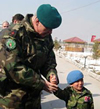Number 8 | June 1, 2007
The recent saber-rattling by Iraq’s Kurdish leaders toward Turkey is disappointing and does injustice to the support that Turkey has given to the Kurdish population in northern Iraq for nearly 40 years.
Turkey has been accepting Kurdish refugees fleeing the Baath regime in Iraq since the late 1960’s. More recently, after the Iraqi chemical attacks on the Kurdish town of Halapja, thousands of Kurds sought refuge in Turkey. In 1991, over 500,000 Kurds fled to Turkey in the course of a few days, in an exodus precipitated by a massive retaliation of the Saddam regime on the Kurdish population in northern Iraq. Turkey, while ill-prepared for such an enormous humanitarian crisis, took responsibility for these refugees, tens of thousands of who ended up staying in Turkey for years, under the care of the Turkish government and at a heavy financial cost. Meanwhile, European countries mostly provided lip service and even the United States accepted a negligible number of Iraqi Kurds as refugees from Turkey. To prevent the Saddam regime from further retaliation, a No-Fly Zone was established in northern Iraq and enforced by aircraft and a ground force based in Incirlik, Turkey. It is no coincidence, hence, that Iraqi Kurdish leaders Celal Talabani and Masoud Barzani, at the time, were able to travel abroad thanks to Turkish passports, issued by Turkish authorities. In 1996, when an American led Kurdish insurrection attempt against Saddam failed, Turkey again stepped in to safely evacuate American forces and thousands of pro-America Kurds.
Turkey has supported the United States and Iraq in many ways. Today, Turkey’s trade volume with Iraq exceeds 10 billion dollars and hundreds of Turkish companies help rebuilding Iraq, including northern Iraq. Turkey remains the most reliable supplier for US forces in Iraq and provides a large percentage of refined petroleum products for the Iraqi population. In fact, Turkey is the main electricity supplier to northern Iraq, making a major contribution to the rapid economic progress seen in this region. Briefly, on Iraq, Turkey’s priorities are almost identical with that of the Unites States. In the words of Turkish foreign minister Abdullah Gul, “The success of the United States in Iraq will be our (Turkey’s) success.”
It is therefore disappointing for Turks to see no decisive action taken by the United States against the presence of the PKK, the Kurdistan Workers’ Party, a terrorist organization recognized as such by the United States, in northern Iraq. This is particularly troubling as the United States has indeed given substantial support to Turkey in its fight against PKK terrorism, just as Turkey has provided the United States with consistent support at the highest levels in fighting global terrorism. The Turkish government and the public cannot be expected to turn a blind eye to the fact that the Iraqi Kurdish leadership allows the PKK a free hand in northern Iraq, get trained and equipped, enabling it to stage deadly attacks inside Turkey. Experts estimate that there are nearly 3,000 PKK terrorists in Northern Iraq. Since its self-proclaimed cease-fire in 2004, the PKK has killed or injured over 1,500 people. In the last three months alone, the PKK has killed 17 Turkish security force members and wounded 18.
If the United States fails to resolve the PKK threat to Turkey in northern Iraq, the prospects for long-term stability in northern Iraq and the expansion of commercial ties with Turkey will diminish. Such a development will certainly not serve United States interests.

























